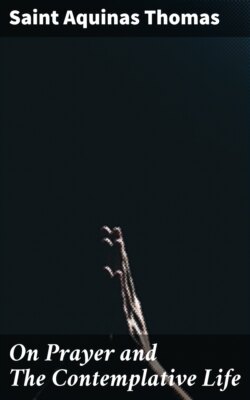Читать книгу On Prayer and The Contemplative Life - Saint Aquinas Thomas - Страница 22
На сайте Литреса книга снята с продажи.
Has Religion, That is Latria,[65] any External Acts?
ОглавлениеTable of Contents
In Ps. lxxxiii. 3 it is said: My heart and my flesh have rejoiced in the living God. Now interior acts belong to the heart, and in the same way exterior acts are referred to the members of the body. It appears, then, that God is to be worshipped by exterior as well as by interior acts.
We do not show reverence and honour to God for His own sake—for He in Himself is filled with glory to which nought can be added by any created thing—but for our own sakes. For by the fact that we reverence and honour God our minds are subjected to Him, and in that their perfection lies; for all things are perfected according as they are subjected to that which is superior to them—the body, for instance, when vivified by the soul, the air when illumined by the sun. Now the human mind needs—if it would be united to God—the guidance of the things of sense; for, as the Apostle says to the Romans[66]: The invisible things of Him are clearly seen, being understood by the things that are made. Hence in the Divine worship it is necessary to make use of certain corporal acts, so that by their means, as by certain signs, man's mind may be stirred up to those spiritual acts whereby it is knit to God. Consequently religion has certain interior acts which are its chief ones and which essentially belong to it; but it has also external acts which are secondary and which are subordinated to the interior acts.
Some deny, however, that exterior acts belong to religion or latria, thus:
1. In S. John iv. 24 we read: For God is a Spirit, and they that adore Him must adore Him in spirit and in truth. External acts belong, however, rather to the body than to the spirit. Consequently religion, which comprises adoration, has no exterior acts, but only interior.
